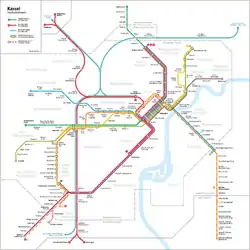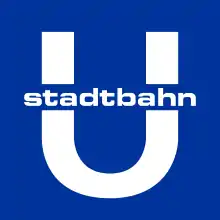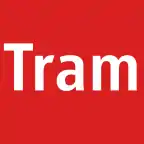Trams in Kassel
The Kassel tramway network is a 93.3-kilometer (58.0 mi) network of tramways,[1] forming part of the public transport system in Kassel, a city in the north of the federal state of Hesse, Germany. As of 2014, the Kassel tram network is made up of seven regular tramlines.[2]
| Kassel tramway network | |||||||||||||||||||||
|---|---|---|---|---|---|---|---|---|---|---|---|---|---|---|---|---|---|---|---|---|---|
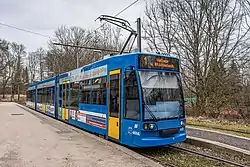 | |||||||||||||||||||||
| Operation | |||||||||||||||||||||
| Locale | Kassel, Hesse, Germany | ||||||||||||||||||||
| |||||||||||||||||||||
| |||||||||||||||||||||
| |||||||||||||||||||||
Opened in 1877 as a steam tramway from Wilhelmshöhe the Königsplatz (Royal Square), the network has been operated since 1897 by Kasseler Verkehrs-Gesellschaft (KVG), and is integrated in the Nordhessischer Verkehrsverbund (NVV). The track gauge is 1,435 mm (4 ft 8+1⁄2 in) standard gauge. There existed also a narrow gauge network to the Hercules monument. The network was extended gradually into the surrounding area, partly as conventional tramways, and partly as a tram-train RegioTram network.
History
In the summer of 1870 a horse-drawn omnibus line opened as part of an industrial exhibition from 1 June to 5 October 1870. The growth of the city made it attractive to operate a steam tram which was opened in 1877 by the English company "Jay & Comp. London". With the first two steam locomotives and four passenger cars they brought visitors to the Royal Palace in Wilhelmshöhe. Soon other vehicles, including locomotives made by Henschel, were added to the rolling stock. The Kassel steam train is considered to be the first tramway in Germany not pulled by horses. In 1881 the company was taken over by another company from Berlin which invested in its electrification in 1897.
The "Hercules Rail" was operated separately until 1927 bringing tourists to the Hercules monument.
System
Tram lines
As of August 2022, the Kassel tram network is made up of seven regular and one additional tramline.[3]
| Line | Route | Remarks |
|---|---|---|
| Line 1 | Wilhelmshöhe – Königsplatz – Vellmar | |
| Line 2 | Brückenhof – Oberzwehren Mitte - Baunatal | Only on schooldays whilst school begins and ends |
| Line 3 | Mattenberg – Murhardstr./Uni – Ihringshäuser Str. | |
| Line 4 | Druseltal – Bebelplatz – Kaufungen – Helsa – Hessisch Lichtenau | Some journeys end at Helsa or Kaufungen |
| Line 5 | Baunatal – Auestadion – Holländische Str. | |
| Line 6 | Brückenhof – Auestadion – Wolfsanger | |
| Line 7 | (Mattenberg – ) Bf. Wilhelmshöhe – Ihringshäuser Str. | Ends at Hauptbahnhof on Weekends |
| Line 8 | Hessenschanze – Bebelplatz – Kaufungen, Papierfabrik |
Rolling stock
Historic fleet
Until 1900 54 railcars were ordered at Van Zypen & Charlier and Crede. From 1955 to 1958 the railcar types "260", "261-288 (2 +2 Tw)" designed by Duewag and built in Kassel were put in service. They were in regular service until 1991. Ten vehicles were given to Gorzow in Poland and later scrapped, one of them went to the Warsaw tram friends. Other presented railcars are in two Dutch railway museums one in Hanover and one in Kassel. The next generation 301-317 and 351-366 was produced by Wegmann in Kassel in the 1960s and in service until 2003. Some of them still exist but are not in regular service any more.
Current fleet
- 417-422 (N8C): 16 units produced in 1981 and 6 in 1986 by Duewag - 401-416 sold to ZTM Gdańsk - 417, 419, 422 transported to Gdańzk in 2019 - only 3 operational units remaining in Cassel - 418, 420, 421
- 451–475 (NGT6C): 15 units produced from 1990 to 1991 and 10 in 1994 by Duewag
- 601–622 (8ENGTW): 22 units delivered by Bombardier from 1999 to 2000
- 631–640 (8ZNGTW): 10 units delivered by Bombardier in 2001 and 2003
- 651-672 (NGT8): 22 units delivered by Bombardier from 2011 to 2013
 Tram in 1995
Tram in 1995
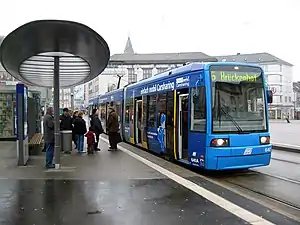 An 8(Z)NGTW unit at 'Königsplatz'
An 8(Z)NGTW unit at 'Königsplatz' An Alstom RegioCitadis of the Kassel RegioTram
An Alstom RegioCitadis of the Kassel RegioTram
References
Inline references
- "KVV Im Überblick 2012" [KVV At a Glance 2012] (PDF) (in German). Kasseler Verkehrs- und Versorgungs-GmbH (KVV). 2012. p. 7. Retrieved 2014-05-03.
- "Tram - Fahrpläne für den Tramverkehr in und um Kassel" [Tram - timetables for tram traffic in and around Kassel] (in German). Kasseler Verkehrs-Gesellschaft (KVG). Retrieved 2014-05-03.
- "Fahrplanbuch und Linienfahrpläne 2022". nvv.de. Nordhessischer Verkehrsverbund. Retrieved 4 September 2022.
- "RegioTram" [RegioTram] (in German). Nordhessischen VerkehrsVerbund (NVV). Retrieved 2014-05-03.
Bibliography
- Höltge, Dieter; Köhler, Günter H. (1992). Straßen- und Stadtbahnen in Deutschland [Tramways and Stadtbahnen in Germany] (in German). Vol. Band 1: Hessen [Volume 1: Hesse] (2nd., enlarged ed.). Freiburg i. B., Germany: EK-Verlag. ISBN 3882553359.
External links
 Media related to Trams in Kassel at Wikimedia Commons
Media related to Trams in Kassel at Wikimedia Commons- Kasseler Verkehrs-Gesellschaft (KVG) - official site
- Track plan of the Kassel tram system
- Kassel database / photo gallery and Kassel tram list at Urban Electric Transit – in various languages, including English.
- Kassel database / photo gallery at Phototrans – in various languages, including English.
